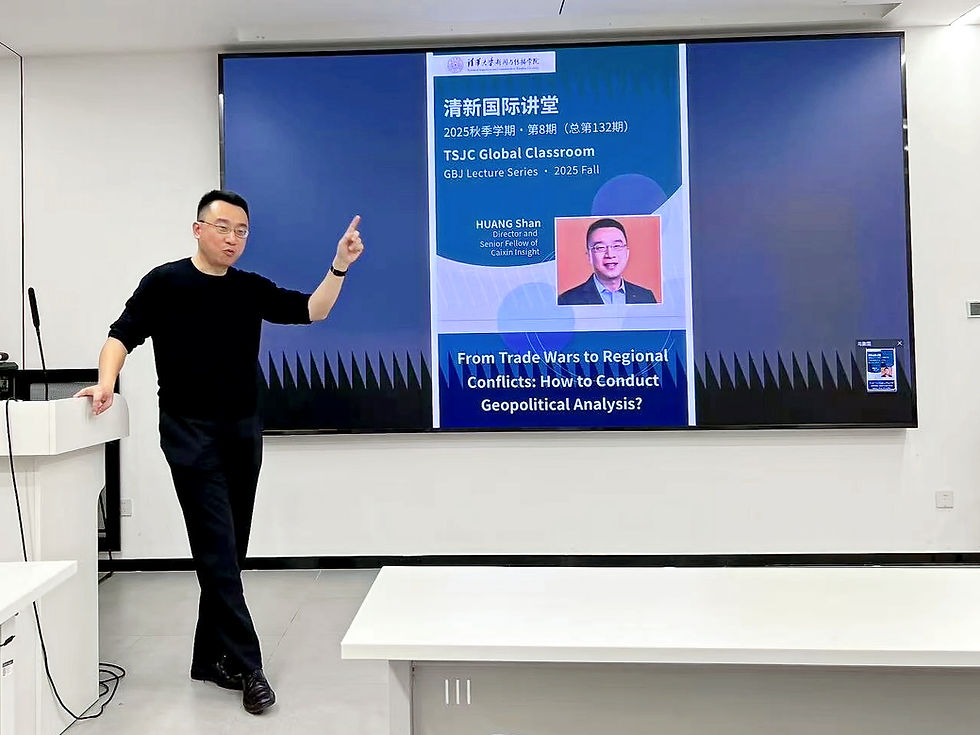Global business: The global supply chain is shifting to Vietnam, but is the country ready?
- Rick Dunham
- Jun 17, 2023
- 3 min read

By NGUYEN HA LINH
Global Business Journalism reporter
Vietnam is one of the biggest beneficiaries of the current shifts in the global supply chain, but the lack of localization in the supply chain and a skilled labor force may limit Vietnam from being the new global production hub, a senior Bloomberg editor told Tsinghua University students.
“There may be more desire to shift things to Vietnam than Vietnam is ready to handle at the moment,” said Derek Wallbank, Managing Editor of Bloomberg News in Singapore.
The trade tensions between the United States and China, coupled with the logistics disruptions caused by the COVID-19 pandemic and the ongoing Russian-Ukrainian war, have exposed the vulnerabilities of relying heavily on a few manufacturing hubs in the global supply chain. Attracted by cheap labor and a business-friendly environment, many companies now see Vietnam as an attractive alternative as they seek to diversify their supply chains.
The influx of foreign manufacturers brings forth promising opportunities for Vietnam to establish itself as a major hub for hi-tech manufacturing and climb up the global value chain. However, concerns linger among some observers who question whether Vietnam’s limited capacity could ultimately hinder its own progress.
One of the main reasons for companies to move to Vietnam is to reduce their levels of dependence on China. But Vietnam itself still largely depends on its northern neighbor for importing raw materials, as the local suppliers in Vietnam are still underdeveloped.
“When companies move to Vietnam, many of them still have to rely on a supply chain from China,” Nguyen Phuong Linh, associate director at Control Risks, said in an interview with the Financial Times.
According to Nikkei Asia, the localization of supplies in Vietnam stands at a mere 37.3%, lagging behind that of some of its Southeast Asian peers, including Thailand and Indonesia. It may not be a big problem for manufacturing giants that have already had properly established supply chains globally and have the financial strength to invest in the local supply chain. This, however, may discourage small businesses from moving to Vietnam.
“It takes a lot of money to invest in the [necessary] equipment when moving the business,” said Kim Tyson Cook, co-owner of Exaco Trading Co., a family-owned wholesale distribution company based in Texas. “You’ve got to have government support to make it as economically as it’s been made in China.”
Vietnam’s lack of capacity to further localize its supply chain is restraining it from moving from being a global assembly to a global production hub. And the labor force, which is one of Vietnam’s biggest competitive advantages due to its low wage, is, ironically, one of the main constraints for Vietnam to move up in the global value chain.
“The availability of skilled workers in Vietnam is not enough to support the demand,” said Thinh Nguyen, CEO of the software consulting company Zien Solutions, in an interview with Nikkei Asia.
Vietnam’s population is in the “golden age," but the number of skilled workers remains low. According to the Ministry of Labor, Invalids and Social Affairs, only 26% of Vietnam’s labor force is fully trained and possesses the necessary qualifications to meet the demands of enterprises.
The challenges persist as Vietnam tries to take full advantage of the shifts in the global supply chain. However, hope is on the way.
New business park developments are being built. Vietnam is the second heaviest spender on infrastructure in Asia, only after China, according to Bloomberg. The Southeast Asian country spends around 6% of its GDP on investing in infrastructure, which is three times higher than that of Thailand and Malaysia. Training programs for workers are also being implemented to raise the quality of Vietnam’s workforce.
“We are now seeing a proper build-out of supply chains here,” Michael Kokalari, chief economist of VinaCapital in Ho Chi Minh City, said to Financial Times.




Comments